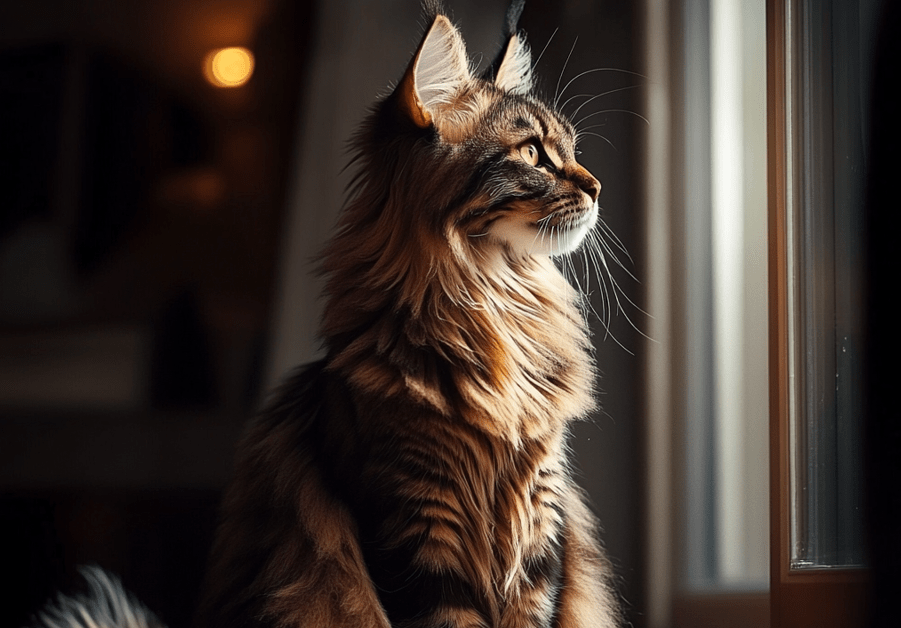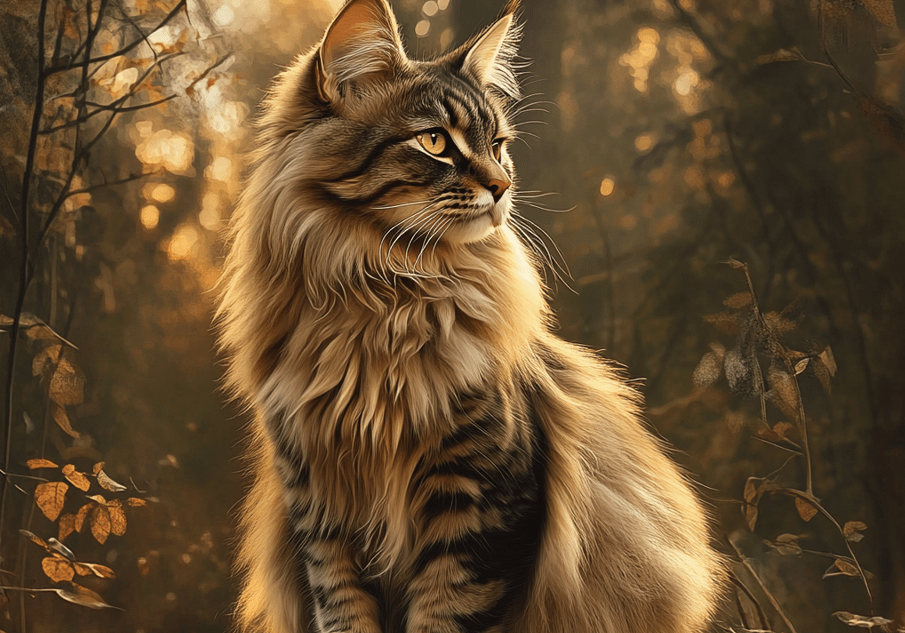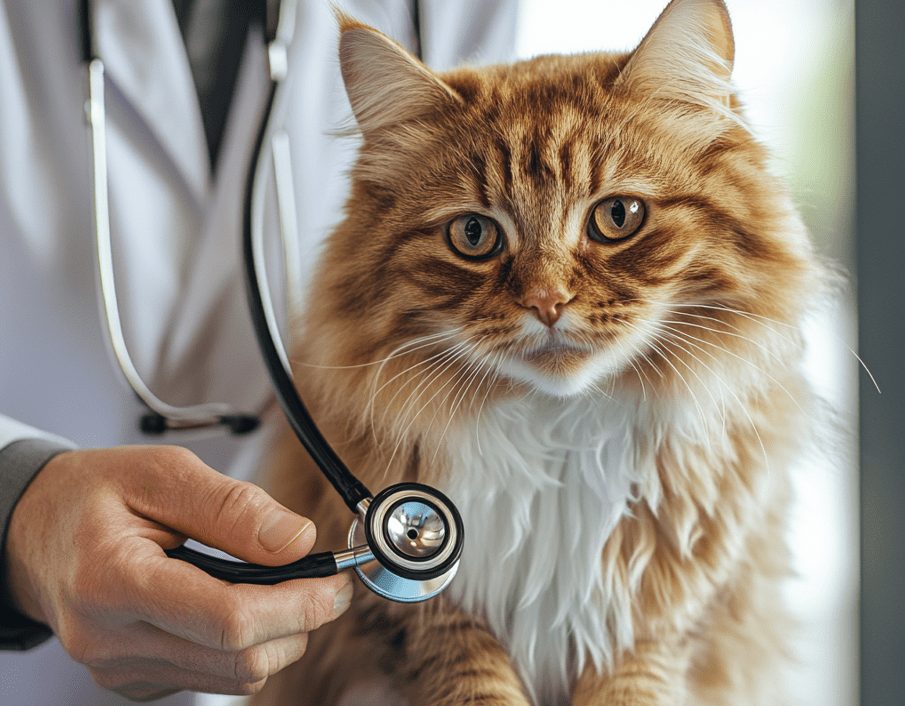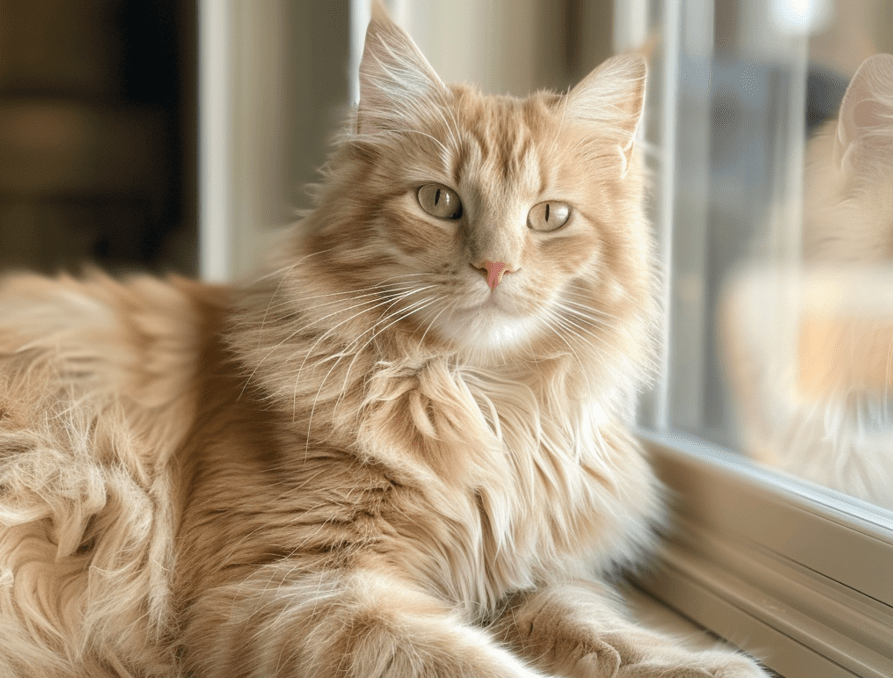
A typical Maine Coon shows a calm nature; however, it becomes important to address behavioral problems immediately to handle them. Behavioral problems in Maine Coons develop from insufficient mental engagement, poor training methods, and medical problems. Owners who identify these behaviors can create suitable responses that allow their Maine Coons to have more joyful and healthier lives. This article will delve into common Maine Coon behavior problems and provide practical advice on how to overcome them. Comprehending and dealing with Maine Coon attributes becomes necessary for fostering rewarding relationships between cat owners and their feline companions.
Separation Anxiety in Maine Coon Cats
Maine Coon cats, regardless of their age, might develop separation anxiety, which represents a widespread feline condition. When separated, Maine Coons display extreme attachment behavior, which brings both personal trauma to the cat and emotional harm to their owners.
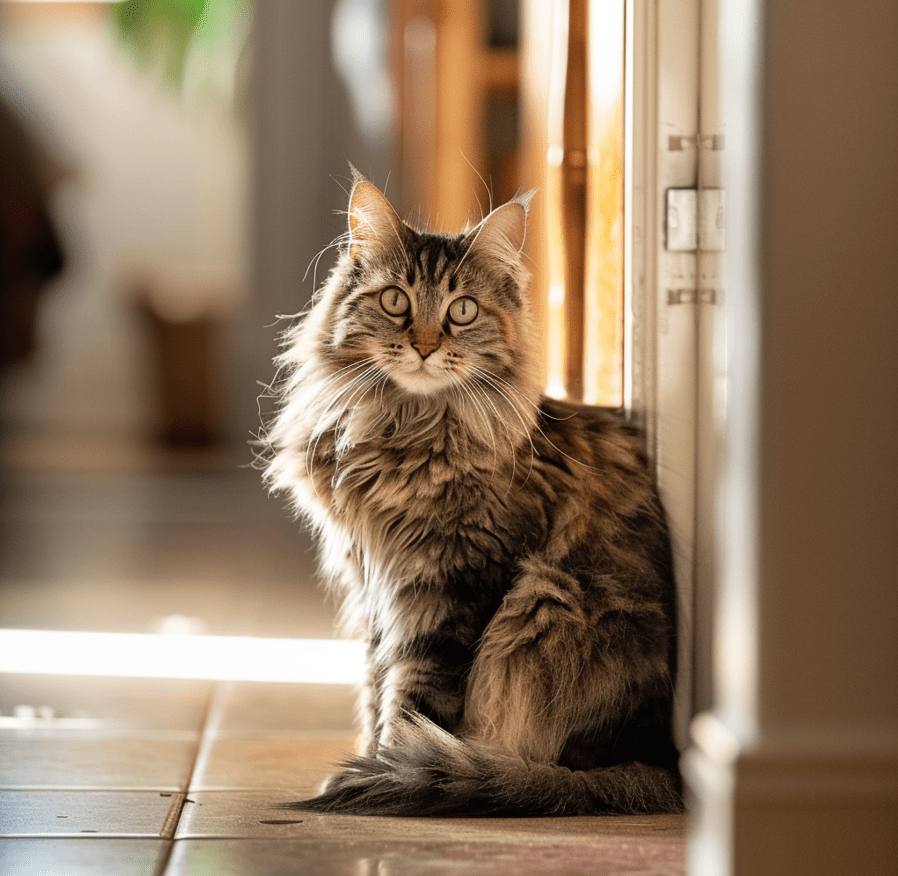
Maine Coon cats’ benefit from proper treatment of separation anxiety by identifying their manifestation of symptoms. Some common indicators include excessive clinginess, restlessness when left alone, Physical attempts to leave the premises together with damage to household items. Excessive vocalization or meowing.
The proper treatment of separation anxiety in cats demands both understanding of their emotions and using both time and useful techniques. Several steps exist to keep your Maine Coon cat feeling safe while you are not at home.
Young cats benefit from occupation-based toys, as these tools serve to reduce nervousness throughout your time away from home. Interactive toys combined with puzzle feeders as well as scratching posts present both mental stimulation and guide their energy in healthy directions.
Begin by letting your anxious Maine Coon spend brief amounts of time alone before extended durations as part of the separation process. The slow process enables your cat to develop familiarity with your time apart from him.
Select a home location that your cat considers secure before using it as their safe space. Select an area in your home for your Maine Coon that contains their favorite toys and bedding as well as the available litter box.
Your cat may benefit from pheromone therapy by using synthetic products through Feliway spray or diffusers to establish a relaxing atmosphere that eases separation-related distress.
Every cat has its own characteristics, which means it will require patience to find the best ways to prevent separation anxiety in your Maine Coon. Your Maine Coon cat will gain comfort when you are away by using patience along with consistency in your approach and remaining understanding of their needs.
Dealing with Territorial Behavior in Maine Coons
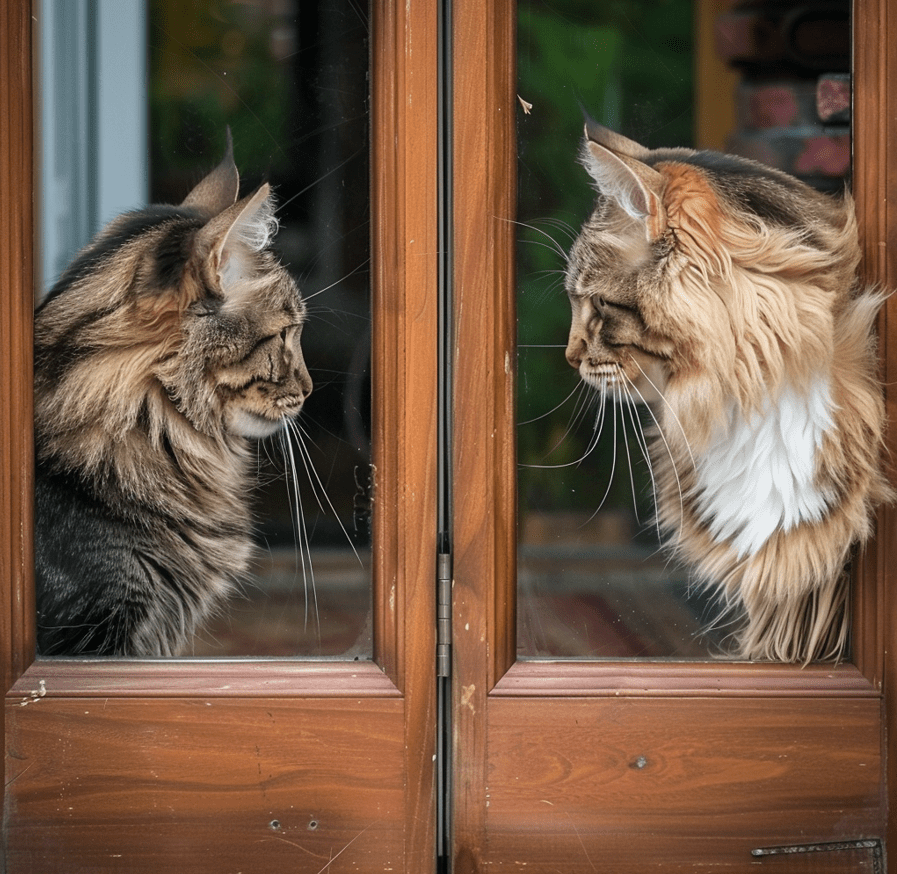
Maine Coon cats exhibit territorial behavior, which increases whenever other animals or cats inhabit their household. Socialization of Maine Coons grows essential at a young age because owners need to properly introduce them to new feline companions. Exposure to other animals during the early stages of life minimizes territorial behavior so that companionship happens smoothly.
The territorial behavior of Maine Coons shows itself through urine marking as well as hissing along with growling and occasional physical confrontations. Prompt addressing of these behaviors will create a tranquil environment in your living space.
The core element to control territorial actions includes appropriate socialization techniques. When your Maine Coon interacts socially with other cats, they become reassured and develop decreased territorial aggression behaviors. Positive socialization emerges through controlled introduction between pets along with regulated activities and positive praise. This leads to effective and positive interactions between animals.
Initial exposure of two cats should happen through separate room separation until you introduce their bedding materials and scent diffusers to let them get acquainted with each other’s odors. The introduction of supervised direct contact sessions between cats can be organized after they display relaxed body postures and show friendliness when standing by doors or gates.
For the introduction process, leave enough resources available for each cat, including their own feeding spaces, litter containers, and resting positions. Providing adequate resources for each cat during this process creates both competition prevention and fewer instances of territorial conflict.
Consulting with a veterinarian or professional animal behaviorist becomes necessary when territorial behaviors do not fade away after attempting your strategies. The expert will guide you with additional advice while creating a personalized behavior modification program that addresses territorial behavior properly.
Managing Excessive Meowing in Maine Coon Cats
Excessive meowing is a natural behavior for Maine Coons, and it becomes a matter of worry for owners because of this breed’s known expressive nature. You need to identify the true causes of their vocal behavior, whether they are seeking food or want someone to pay attention to them, before trying any management techniques. Your actions to properly respond and solve potential causes will decrease meowing frequency while establishing a calm setting for you and your cat. Before managing excessive meowing behavior, you need to eliminate any current health problems in your Maine Coon. Through veterinary consultation, you should check for medical issues when your Maine Coon displays meowing accompanied by changed behaviors.
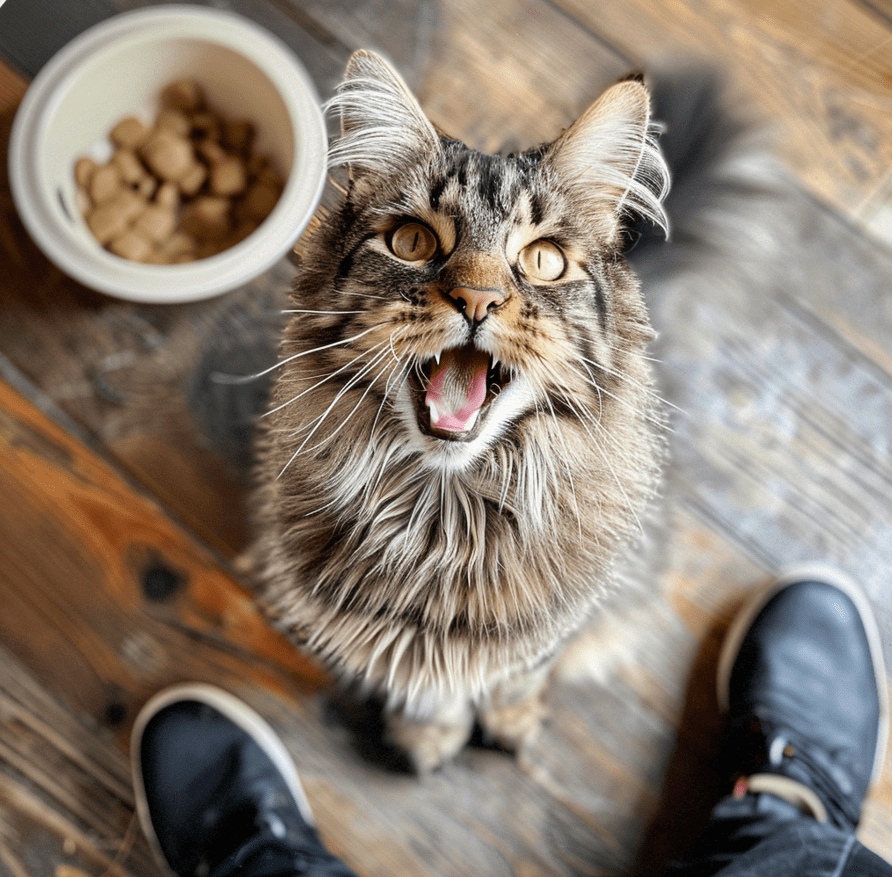
Detection of the factors leading to excessive meowing becomes vital for controlling the issue successfully.
Before implementing these management strategies, you should resolve all health-related issues affecting your Maine Coon.
Provide Enrichment and Distractions
Maine Coons tend to meow excessively because they do not receive proper stimulation or become bored. Make your cat entertained all day by giving various puzzle toys and interactive activities in addition to different types of playthings. The distractions will help your Maine Coon redirect their focus, thus minimizing their tendency to make loud vocalizations.
Establish a Routine
The simple routine of Maine Coons enables them to feel better, which leads to lower amounts of anxiety and decreased meowing behavior. Your cat will find comfort from knowing when their feedings, playtimes, and rest periods occur since this establishes routine and assurance.
Fulfill Their Basic Needs
Your Maine Coon may express their unmet needs through excessive vocalization because their needs are not being fulfilled correctly. Owners should provide their Maine Coons with continuous access to fresh water and provide them with a comfortable sleeping area coupled with a clean litter box. Stress develops when essential needs fail to be met, which leads to greater vocalization from your cat.
Addressing Litter Box Problems in Maine Coons
The litter box is instinctually natural for Maine Coons since these cats tend to keep themselves clean. Production of litter box issues can occur when your Maine Coon behaves unexpectedly toward their regular litter box habits. A non-litter box behavior signals the need for your intervention toward potential litter box issues.
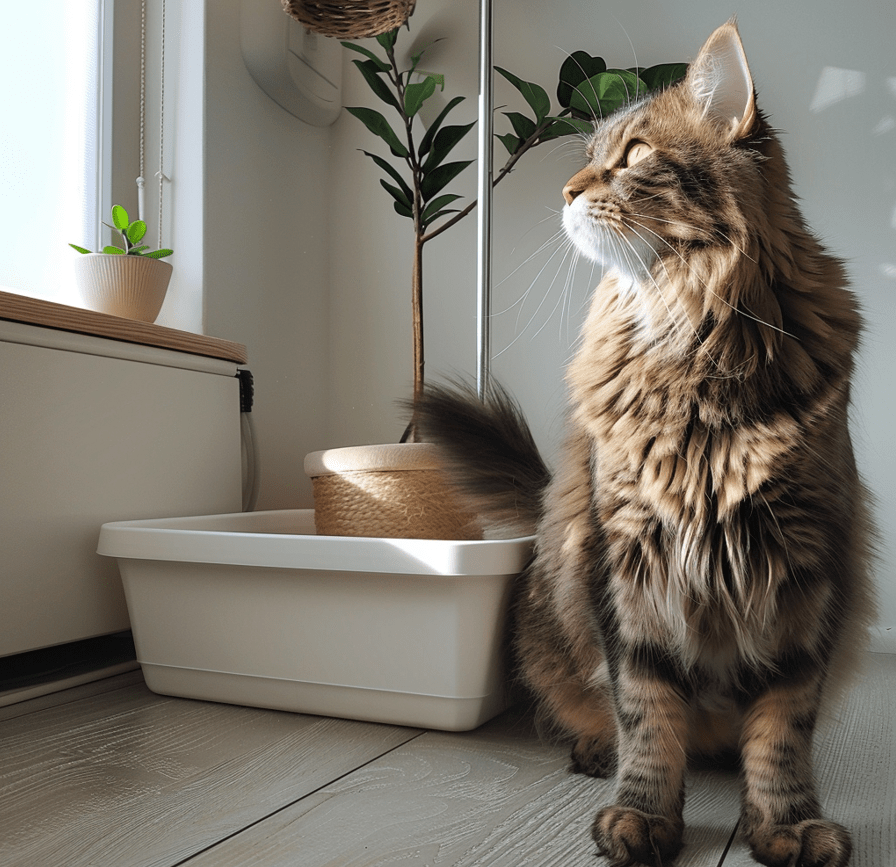
Your Maine Coon avoids using the litter box or uses it infrequently since it signals multiple possible health-related issues. The healthcare condition of your cat creates discomfort or pain when it attempts to use the litter box. Pay attention to behavioral signals, which include difficulties with urination or defecation and multiple accidents outside the box, together with blood in urine or stool. The speedy visit to a veterinarian is necessary for anyone displaying these symptoms because you need to handle possible medical conditions.
Your Maine Coon may establish an aversion to the litter box environment. Cats, as a natural species, maintain cleanliness among themselves while preferring certain conditions for their bathroom routines. The combination of unclean or insufficient space or unfavorable placement of the litter box causes Maine Coons to seek alternative elimination locations.
The practical advice for solving litter box problems with Maine Coons includes:
You should clean the litter box daily by scooping it a minimum of once per day. Maine Coons prefer spaces where humans keep the litter box clean since they use the containers more effectively. Thorough cleaning of the litter box prevents unwanted odors, which usually discourage cats from using their designated area.
The litter box should be sufficiently roomy for your Maine Coon to both move about easily and scratch and dig. Maine Coons possess their noteworthy large physique, which requires an adequately ample litter box for these animals.
Destructive Chewing and Biting
The origin of destructive chewing and biting in Maine Coons typically derives from three main factors, including boredom combined with anxiety and teething in kittens as well as insufficient chewing items. This problem needs treatment through proper substitute items and identification of the basic causes.
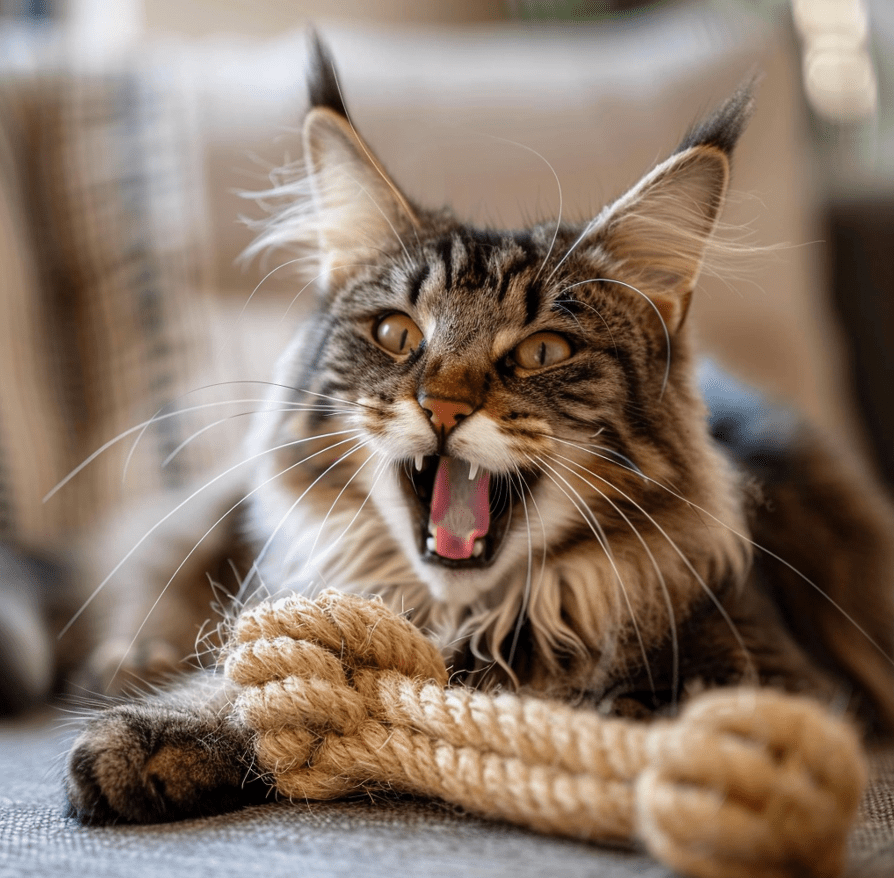
Such behavior management techniques help control and minimize chewing along with biting injuries:
Your Maine Coon needs appropriate chew toys of various types that are both safe and durable for cats. Your Maine Coon will stay fascinated by rotational changes in chew toys.
Boredom reduction through regular play sessions helps your Maine Coon decrease its desire to chew inappropriate items.
Work to decrease the triggers that cause anxiety because anxiety appears to be the main reason behind destructive behavior. Your Maine Coon requires a protected setting, which makes him feel safe.
Psychological safety improves by keeping valuable and dangerous items where Maine Coons cannot access them to avoid accidents.
Teach your Maine Coon to understand the word “Ouch” by applying it when biting happens. After each incident, remove your attention from your pet. Physical punishment produces negative effects because it causes anxiety and aggression to increase in your Maine Coon.

